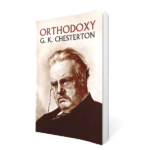In this age of Puritanism and Hedonism, Chesterton’s view of the seven deadly sins seems the ultimate in paradox. Unlike the pleasure-seeking hedonists, Chesterton believed in the reality of sin. Unlike the prohibition-minded Puritans, he believed in enjoying God’s pleasures to the full.
Chesterton taught us:
- to believe wholeheartedly in sex but not to believe in lust
- to pursue leisure passionately but not to pursue laziness
- to defend private property and to attack the sin of greed
- to think that fighting is often right but that wrath is always wrong
- to know that having a rival is a good thing and that envying a rival is a bad thing
- to do everything to promote festivity and everything to avoid gluttony
- to strive to be good while striving not to be proud
To Chesterton, in short, “Salvation is not negative, but highly positive.”
Chesterton’s wisdom is as counter-cultural today as it was ninety years ago. He noticed then that the repressive Puritans and the hedonistic libertines agree on one crucial thing, that religion is mainly concerned with moral restraints and prohibitions — with negatives. If you want to scandalize both sides in this conflict, follow Chesterton’s example. Say grace before lighting a cigar.


